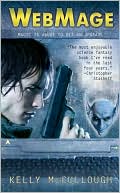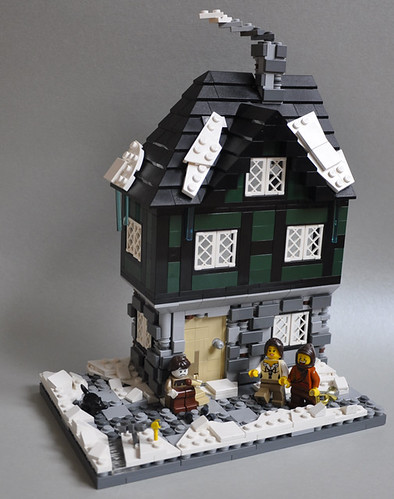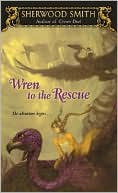Welcome to the last First Book Friday of 2010. I’ll be taking a break for the next few weeks, but we’ll hopefully get more author stories next month. Finishing out the year is Kelly McCullough.
Kelly’s series blends mythology, magic, and hacking, but most importantly, he also writes about webgoblins. And as we all know, goblins make everything better. (Click here for my thoughts on some of his books.)
Kelly’s web site doesn’t include much biographical information. Therefore we are free, nay obligated, to make stuff up. I’ll start by revealing that Kelly McCullough used to make extra money as a crash test dummy for Go Carts.
#
I started writing seriously in 1990, finishing my 1st novel in about four months. I did it mostly because I’d met a wonderful woman who I intended to marry.
I wanted to have something approaching a normal life as well as a successful marriage and for me that meant giving up theater a career trajectory I had been on since the age of 11. Writing a novel was artistic methadone for my theater addiction. It also turned out to be a much more compelling artistic drug, at least for me, but I didn’t know that going in.
The novel was called Uriel and it’s currently trunked. It was a contemporary fantasy written around a mafia hitman/vampire protagonist and the return of magic into the world with the coming of the harmonic convergence. Despite that, it actually didn’t suck and I may some day write it again from scratch since I still love the plot. It even got some moderately hard nibbles from big New York houses. If I’d known then what I know now I might have been able to rewrite it to spec from one of those rejections and sell it to the editor in question.
Not knowing that and having my first-born novel rejected was the best awful thing that ever happened to me because it forced me to keep growing as a writer and to try something different. If I’d sold Uriel straight out of the gate, I might well be into my second decade of a mediocre but possibly quite successful career.
My 2nd novel was a fantasy farce called Swine Prince. It also got serious attention from New York, though it never quite cleared the bar. It’s on its third major incarnation at this point and off seeking a publisher once again. It’s fast, it’s funny, and in its current form it might well sell. Not selling it right of the gate was the 2nd best awful thing that happened to me, for pretty much the same reasons. You might be starting to see a pattern.
My 3rd novel was a traditional fantasy piece, book one of a trilogy. It’s currently trunked, but might well be rewritten and sold since the world and magic system I built it on provides the scaffold for my Kingslayer books, three of which are forthcoming from Ace in 2011 and 2012. Not selling it was the 3rd best awful… Etc.
My 4th novel was a category-defying book called WebMage [B&N | Mysterious Galaxy | Amazon], call it cyberfantasy with humorous undertones. I wrote it in 1998/1999 after taking a novel hiatus to write short stories. It’s the book that got me an agent. It started being shopped around in 2000, the year I was a Writers of the Future winner but it didn’t sell then, and that was the 4th most…
Somewhere in here, I formulated my basic view of the publishing industry and breaking in. Selling your book is like trying to knock down a brick wall with your forehead. It seems an impossible task until you remember that your forehead heals and the wall doesn’t, so if you’re persistent…
I wrote a 5th book, Winter of Discontent, and a 6th, Numismancer, and a 7th, The Urbana. As I was outlining my 8th, Chalice, I got a call from my agent. It was in the middle of the biggest family mess of my entire life which was an awful thing with no redeeming features.
 Because of that, I was pretty distracted when I got the call. So much so that it wasn’t until my knees gave out that I realized my agent was telling me he’d just landed a two book deal for WebMage and a sequel. Then I was sitting down.
Because of that, I was pretty distracted when I got the call. So much so that it wasn’t until my knees gave out that I realized my agent was telling me he’d just landed a two book deal for WebMage and a sequel. Then I was sitting down.
The funny thing was that I wasn’t wildly happy, as I’d always expected to be when I got that news. No, I was just profoundly relieved. All of the work and sacrifice and pain wasn’t going to have been for nothing. Later, I was happy and giddy and all those other things, but the first feeling was simple relief. I hadn’t chosen the wrong path.
I wrote two more novels before WebMage hit the shelves, Chalice, and the sequel to WebMage, Cybermancy.
So, how do you get from first book written to first book on the shelves of your local bookstore? In my case, you write a bunch more books. You keep going no matter the disappointment and you keep trying to make each book better than and different from the last one, and someday the wall comes down.






 Because of that, I was pretty distracted when I got the call. So much so that it wasn’t until my knees gave out that I realized my agent was telling me he’d just landed a two book deal for WebMage and a sequel. Then I was sitting down.
Because of that, I was pretty distracted when I got the call. So much so that it wasn’t until my knees gave out that I realized my agent was telling me he’d just landed a two book deal for WebMage and a sequel. Then I was sitting down.
 So when I turned nineteen, I figured I needed to learn something about writing, and I pretty much stopped trying to send things out for another fifteen years, though I never stopped writing. Every five or six years I’d take out Wren again and try a new rewrite, and in the late eighties, I was lucky enough to catch the eye of
So when I turned nineteen, I figured I needed to learn something about writing, and I pretty much stopped trying to send things out for another fifteen years, though I never stopped writing. Every five or six years I’d take out Wren again and try a new rewrite, and in the late eighties, I was lucky enough to catch the eye of